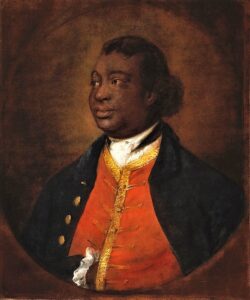
Ignatius Sancho
By Thomas Gainsborough, 1768
Ignatius Sancho (c.1729-1780) was born to an enslaved woman on a ship en route from Guinea to Cartagena, Columbia. After relocating to England, he worked as a servant in Greenwich and then for the Duke of Montagu. During these years, he learned to read and write and was introduced to prominent literary, artistic, and musical circles. At some time after 1773, he opened a grocery and oil supply business in Westminster. His shop became a popular meeting place for some of the most influential artists, writers, actors, and politicians of his time.
Known during his life as “the extraordinary Negro,” Sancho was an abolitionist and wrote extensively about enslavement. His letters were published after his death in 1780 and were an immediate bestseller. Additionally, he was a financially-independent householder, allowing him to become the first person of African origin to vote in parliamentary elections in Britain as well as the first to be given an obituary in the British press.
Sancho is also one of the first known composers of African origin to publish music in Western Europe. His compositional output includes a collection of songs and three sets country dances for assorted instruments. A Theory of Music is also attributed to him, but it is no longer extant. His complete works have been published in facsimile and edited by Josephine R.B. Wright (New York: Garland, 1981).
Resources
Sources
King, Reyahn. Ignatius Sancho: An African Man of Letters. London: National Portrait Gallery, 1997.
Wright, Josephine. “Sancho, Ignatius.” Grove Music Online. 2001.
Works Featured on Expanding the Music Theory Canon
Trip to Dilington
Excerpt
Pages: Triads, V, V7+ Inversions
Lord Dalkeiths Reel
Excerpt
Page: Predominant
Dutchess of Devonshires Reel
Excerpt
Page: Modulation